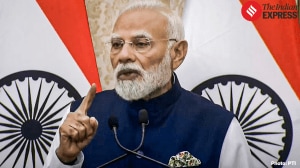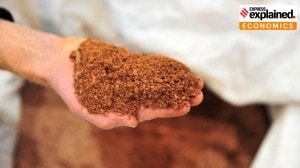ABB, BHEL lock horns in mega battle
It's the latest power struggle in town. And at the heart of it are India's largest power equipment supplier BHEL and the Swedish giant AB...

It’s the latest power struggle in town. And at the heart of it are India’s largest power equipment supplier BHEL and the Swedish giant ABB. In fact, with the country’s elections just round the corner, another participant in this giant struggle, though an unwilling one, is power minister P.R. Kumaramangalam. Making things spicier is the presence of the Congress party, whose spokesperson Ajit Jogi even held a press conference arguing that the BJP-led government was trying to favour ABB over its Indian rival.
As power minister, Kumaramangalam sort of lords it over the big public sector power generating company, NTPC, which is currently in the process of placing orders for over Rs 10,000 crore of power generating equipment that both the Rs 7,000 crore BHEL and the Rs 1,40,000 crore ABB are competing for. Worse, Kumaramangalam’s constituency, Trichy, is actually one of BHEL’s home-towns — BHEL’s Trichy unit directly employs 15,000 people and is the main source of orders for another 200 ancillary units in thearea.
So if NTPC doesn’t give an order to BHEL, Kumaramangalam’s a dead duck. It hasn’t helped that, at one time, Kumaramangalam actually argued against giving price preferences (such as the one BHEL gets in comparison to foreign suppliers) as they were `archaic and antiquated’.
Not surprisingly, BHEL’s actually using Kumaramangalam’s discomfiture to argue against NTPC trying to bring down its bid price for their Talcher power project by around Rs 100 crore — Kumaramangalam, for his part, is trying to get NTPC to postpone a final decision so that it doesn’t affect his poll chances! Power ministry sources, in fact, reveal that NTPC may even cancel the bids for four other power plants — Kawas, Gandhar, Anta and Auriya — if things go on this way.
The centre of the controversy, of course, is NTPC’s order for the 2000 MW Talcher project last December. Three companies bid for it — BHEL, Construction Engineering which is owned by ABB and a company called Foster-Wheeler. BHEL argues that the discriminationagainst it started right around now. While both ABB and Foster Wheeler deviating from the tender stipulations considerably, as NTPC’s own evaluation report of April stated, BHEL’s been arguing that it should have been awarded the contract at that stage itself. Stretched forward, the argument is that the re-bid was ordered essentially to give foreign giants like ABB another chance. The power ministry’s view as well as that of NTPC, on the other hand, was that they needed more competition, and so the project was re-tendered.
In the next round in May, however, ABB decided to change its strategy, and said that 93 per cent of the machinery it was supplying would be produced in India by its subsidiary, ABL — in its December bid, the import content was to be a little under 70 per cent. Under the rules for projects where international competitive bidding is done, if equipment is produced locally, it gets a 15 per cent advantage over that produced abroad — so by reducing the import content of its proposal, ABB wasensuring that it didn’t get priced out due to the domestic-producer criterion. BHEL, however, argued that ABL was incapable of producing this equipment, and that this change in domestic content was done just to deny BHEL the price-preference advantage. With Ajit Jogi chipping in on BHEL’s side at this point, NTPC then sought the additional solicitor general’s view and this said that the ABB bid could not be entertained since ABL could not produce the necessary equipment locally — `ABB-CE has proposed ABB-ABL as their assignee which is non-viable under bid evaluation’, the opinion said.
This done NTPC then awarded the bid to BHEL last month, but asked it to match ABB’s offer of Rs 1,303 crore. While BHEL refused to do so, arguing that ABB’s bid had been found to be `non-responsive’ anyway, ABB decided to fight this further last week. It sought legal opinions from luminaries such as former Chief Justice A.M. Ahmadi, stating that disqualifying it was wrong. ABB employees also petitioned the Chief VigilanceCommissioner N. Vittal on the matter, arguing that NTPC was indulging in post-tender negotiations with BHEL, and this showed a bias in BHEL’s favour. Running almost parallel to this controversy is another, this one centered around NTPC’s projects in Anta, Auriya, Kawas and Gandhar. This time over a last minute addition to the tender terms, at 5 in the morning the tender was to be opened on June 30. BHEL contends that these changes were made at the last minute specifically to help ABB. Till then, diesel was not allowed as a fuel for running power plants. ABB, however, had been arguing that it should be allowed to use diesel instead of just naphtha as in India, arguing that this was a global practice. The power ministry then wrote to the petroleum ministry and got its clearance three days before the tender was to be opened — this was then communicated to the bidders at 5 am!
So when ABB bid for Kawas and Gandhar, its bid says that though the bid has been given for naphtha as a fuel, it was also suitable forthe diesel variant. ABB, BHEL argues, benefits specifically from this as it has expertise in diesel equipment.
But now, guess what? Instead of going ahead and evaluating the bids — BHEL is the sole bidder for the Anta and Auriya plants — NTPC’s on the verge of scrapping all the bids, arguing that there are such large deviations from what the tender prescribed, that all of them are `non-responsive’. When that happens — an NTPC committee is currently looking into this suggestion — you can bet the cross-fire will begin all over again. The Anta, Auriya bids were cancelled, BHEL will certainly argue, because the government wanted to give ABB another chance. The Kawas, Gandhar bids were cancelled, ABB’s friends will say, because their bid was superior to BHEL’s. The struggle for power goes on.





- 01
- 02
- 03
- 04
- 05








![Kadapa, [Andhra Pradesh], 27 May (ANI): Andhra Pradesh Chief Minister N Chandrababu Naidu and state Minister Nara Lokesh in conversation during the Telugu Desam Party's (TDP) annual three-day Mahanadu conclave, in Kadapa on Tuesday. (ANI Photo)](https://images.indianexpress.com/2025/05/tdp.jpg?w=300)

















